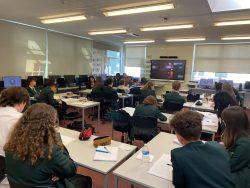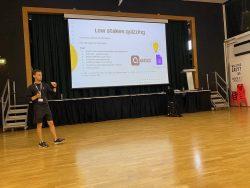English Enrichment Opportunities
Last Friday Year 11 students had the opportunity to spend 3 hours focussing on aspects of their English GCSE content. So often students’ learning is broken up into 1 hour...
Filter by Category
Filter by Author


























































































































































































Last Friday Year 11 students had the opportunity to spend 3 hours focussing on aspects of their English GCSE content. So often students’ learning is broken up into 1 hour...
Posted by Jeremy Turner

The transition from Year 11 to education at Post 16 level is a big step and students need to ensure that they are well prepared for any interviews to access the next important...
Posted by Jeremy Turner

Students in Maple House had a great start to the day last Thursday in their motivational House Assembly led by their Head of House Mr Burnell. Reflecting on the Theme of the Week...
Posted by Jeremy Turner

Last Wednesday after school we held our first Teacher Toolkit of the year and heard from two of our Advanced Lead Teachers in the Main Hall. Sharing some excellent strategies for...
Posted by Jeremy Turner

Elm House are very fortunate to have Mr Cox as their Head of House and he led a really good House Assembly last Wednesday focused on the theme of the week Community. We are all...
Posted by Jeremy Turner

Last Friday, a group of 50 year 11 students, accompanied by Mr Carter, Mr Godfrey, Mrs Godfrey, Mr Waygood, Mrs Hedges, and Ms Hofer, embarked on an educational journey to the...
Posted by Anthony Carter

Banned Books Week: The Power of Unsilenced Voices This week (October 1st – October 7th) we celebrate Banned Books Week, an annual event that champions the freedom to read. It’s a...
Posted by Anthony Carter

MFL Year 10 Enrichment Day Enrichment day for Year 10 MFL students comprised a role play activity, a treasure hunt and an interactive film clips session. The day started with...
Posted by Hilarie Charles

ENRICHMENT DAY : YEAR 10 Options Activities On Friday 29th September the new Year 10 Sports Studies class visited Rickmansworth Aquadrome and spent a day with the Bury Lake Young...
Posted by Ashley Cartledge

Mr Ash had a bit of fun with his House family on Wednesday morning of this week and showed himself as the King of Willow House, celebrating being top of the House Point league...
Posted by Jeremy Turner
Banned Books Week: The Power of Unsilenced Voices
This week (October 1st – October 7th) we celebrate Banned Books Week, an annual event that champions the freedom to read. It’s a time to highlight the value of free and open access to information. Banned Books Week brings together the entire book community — librarians, booksellers, publishers, journalists, teachers, and readers of all types — in shared support of the freedom to seek and express ideas.
Famous Examples of Banned Books:
To Kill A Mockingbird by Harper Lee – This classic novel has been challenged and banned due to its themes of racism, but is now one of the most taught books in the world – 70% of American school children study the text!
The Catcher in the Rye by J.D. Salinger – This book has previously been banned due to its language and themes of rebellion, but nowadays, it is the second most taught book in North America
1984 by George Orwell – The dystopian novel has been previously banned for its political themes and supposed pro-communist message
The Grapes of Wrath by John Steinbeck – This book has been banned previously due to its portrayal of migrant workers during the Great Depression.
Romeo and Juliet by William Shakespeare – This classic tragedy – which our Year 9 pupils are currently studying – is presently banned in Florida due to the state’s Parental Rights in Education Act! The state has also banned Macbeth (which our Year 11 students are currently revisiting) and Hamlet!
Why Were They Banned?
Books are often banned or challenged because they present ideas or content that some people find uncomfortable or disagree with. They may deal with difficult themes, or challenge the status quo. However, it’s important to remember that one of the fundamental principles of literature is to explore the human condition in all its complexity.
Why Should You Read Them?
Banned books often deal with important social issues and can provide a valuable perspective on the world. Reading these books can help us understand different viewpoints and experiences, promoting empathy and critical thinking. They challenge us to question our assumptions and broaden our horizons.
This Banned Books Week, pick up a previously banned book from the LRC!


This year the English Faculty will be honouring Charles Dickens by promoting his novels each month in the BMS newsletter. With Year 8 currently studying his work, it seems...